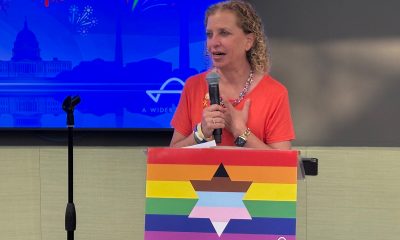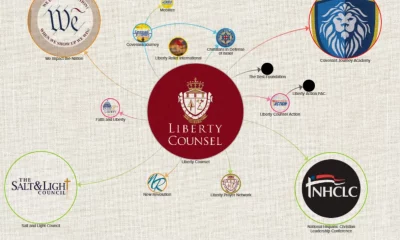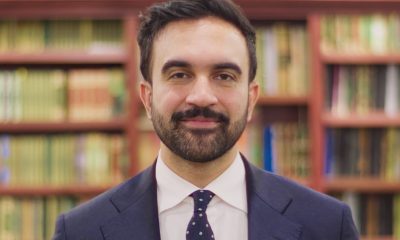Middle East
‘I don’t want a genocide to be done on queer people’s behalf’
LGBTQ Palestinians speak about Oct. 7, war in Gaza
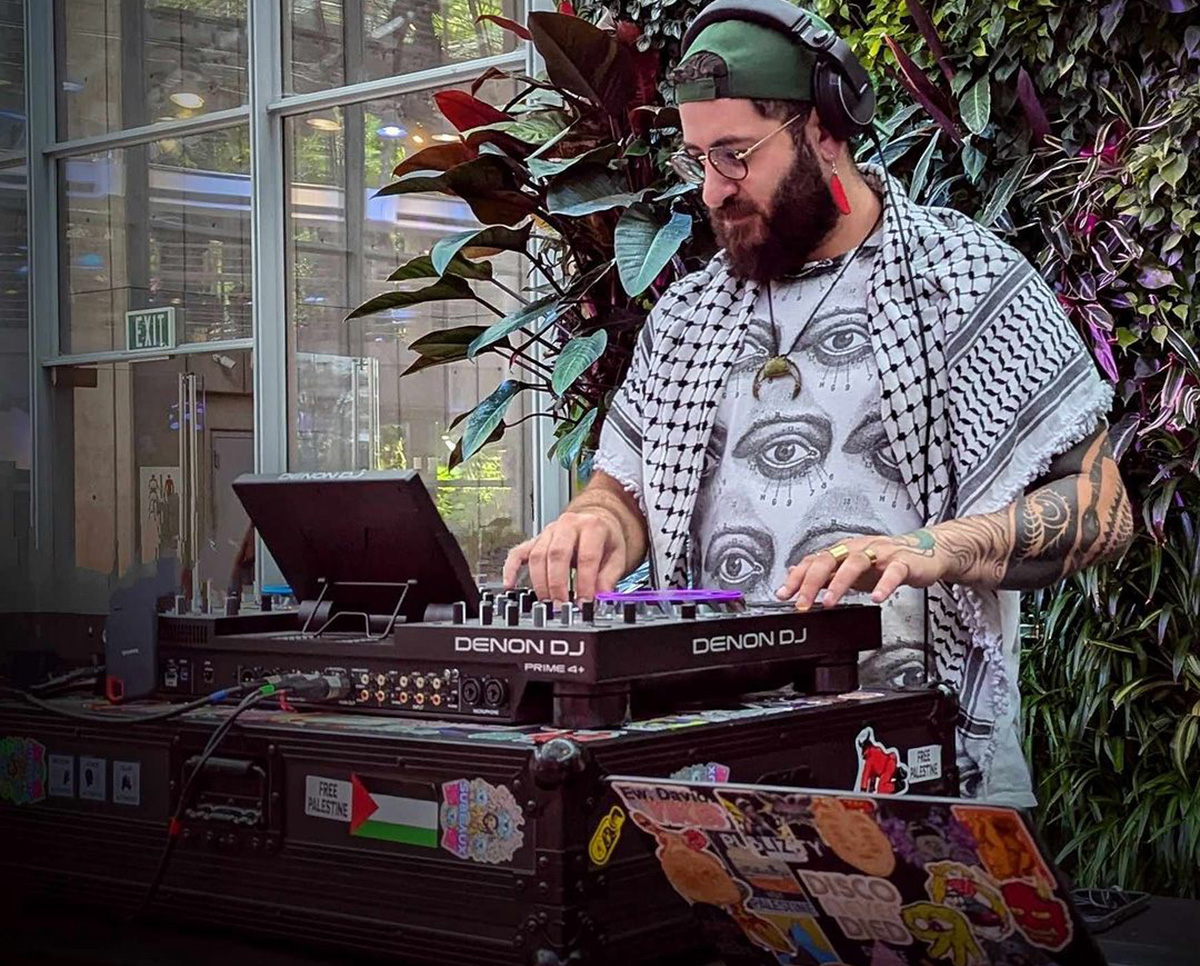
Editor’s note: International News Editor Michael K. Lavers will be on assignment in Israel through Oct. 9. Meta also removed this article from Lavers’s Facebook pages shortly after he published it.
Two LGBTQ Palestinians who spoke with the Washington Blade last week condemned Hamas’s surprise attack against southern Israel on Oct. 7, 2023. They also expressed condemnation of the subsequent war in the Gaza Strip, and the Israeli government’s policies towards the Palestinians.
Zaheer Subeaux is a queer Palestinian producer, DJ, emcee, and community organizer who lives in California. He is originally from Deir Dibwan, a small city on the West Bank that is a couple miles east of Ramallah, the Palestinian capital.
“For a lot of Palestinians who have family back home, this seemed like a proportionate response to an oppressed people,” he said. “For everyone else who’s not paying attention, who allow their tax dollars to continue fund this genocide, for them it’s like, oh, shocking, oh, wow, right out of the blue, because they’re not paying attention to what’s happening.”
“For the rest of us who actually are, this seemed like a completely reasonable thing for a people to feel during a time like this,” added Subeaux. “I don’t think a lot of people have the context for that.”
Hannah Moushabeck is a queer, second-generation Palestinian American who lives in Massachusetts.
Her family is from West Jerusalem. Moushabeck has relatives in Ramallah and in Beirut, the Lebanese capital, and has friends in Gaza with whom she has “been in daily communication.”
“My immediate reactions on Oct. 7 were obviously horror and fear of what’s to come and the violence that happened that day,” she told the Blade on Sept. 30 during a telephone interview.
Moushabeck said it is “not unusual for Palestinians in the diaspora to experience some of this violence happening in our homeland.”
“This is honestly something that’s been going on since well before I was born,” she said. “So, growing up, whenever my parents seemed upset or, Palestinians were being shown in the news, I knew it was likely because they were being killed or involved with some kind of intense violence.”
Moushabeck said “a lot of Palestinians kind of had an instinct to go through the motions when Oct. 7 happened.”
“We also recognized that it was really unprecedented, and that the reaction and the revenge that the Israeli government took out on Palestinians would be like nothing we’ve ever seen before,” she added.
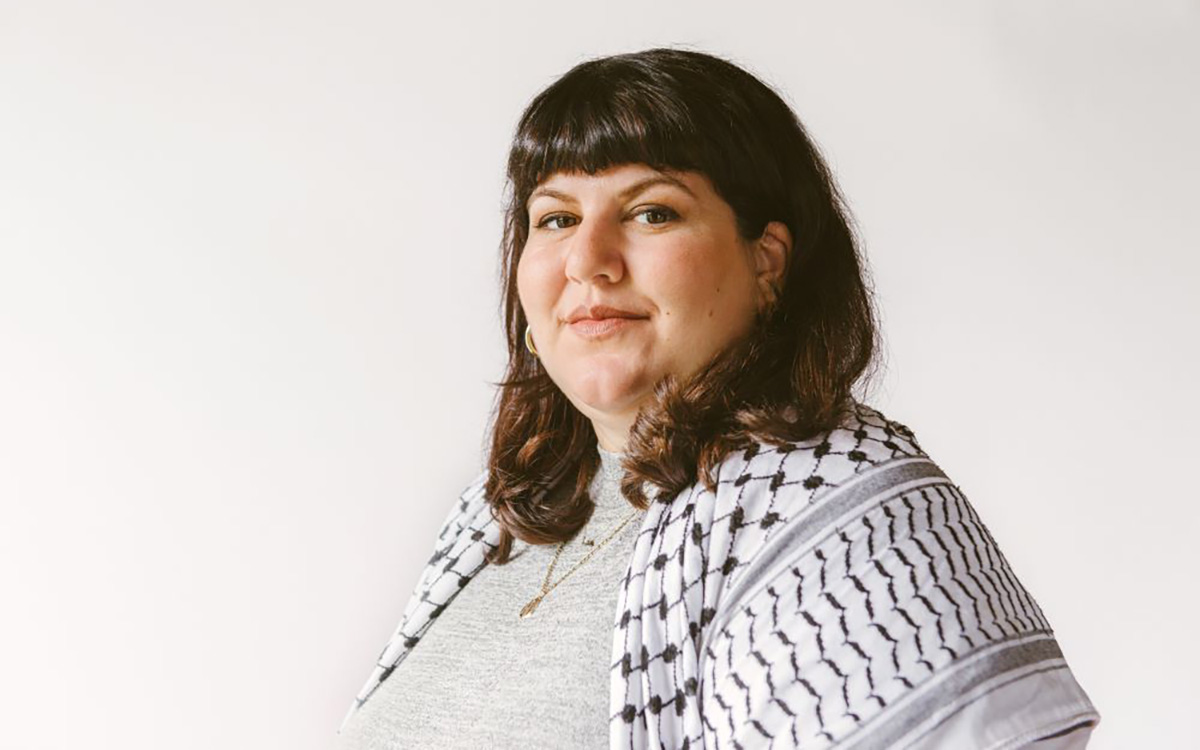
Monday marks a year since Oct. 7.
The Israeli government says militants on that day killed roughly 1,200 people, including upwards of 360 partygoers at the Nova Music Festival near Re’im, a kibbutz that is a couple miles from the Gaza border. The Israeli government says the militants also kidnapped more than 200 people on Oct. 7.
The Hamas-controlled Gaza Health Ministry says Israeli forces have killed more than 41,000 people in the enclave since Oct. 7.
Hamas, which the U.S. and Israel have designated a terrorist organization, claimed responsibility for an Oct. 1 attack at a Tel Aviv light rail station that left seven people dead and more than a dozen others injured. A Bedouin man on Sunday killed an Israel Border Police officer and injured 10 others when he attacked a bus station in Beersheva in southern Israel on Sunday.
Reuters on Friday reported the Lebanese Health Ministry said Israeli airstrikes in Beirut and elsewhere in the country over the last two weeks have killed more than 2,000 people. Iran last Tuesday launched upwards of 200 ballistic missiles at Israel in response to an Israeli airstrike in the Lebanese capital on Sept. 27 that killed Hassan Nasrallah, the long-time leader of Hezbollah, an Iran-backed militant group.
An Israeli airstrike in the West Bank city of Tulkarem on Oct. 3 killed 18 people in a Palestinian refugee camp.
The Israel Defense Forces and Shin Bet, the country’s security agency, said the airstrike killed Zahi Yaser Abd al-Razeq Oufi, a senior Hamas commander, and 11 other Hamas operatives. The Associated Press reported the airstrike also killed a family of four, including two young children.
The AP cites Palestinian officials who say an Israeli airstrike on a mosque in Deir al-Balah, a town in central Gaza, killed at least 19 people.
The International Criminal Court in May announced it plans to issue arrest warrants for Israeli Prime Minister Netanyahu, Israeli Defense Minister Yoav Gallant, and three Hamas leaders — Yehya Sinwar, Mohammed Deif, and Ismail Haniyeh.
Karim Khan, the ICC’s chief prosecutor, said the five men have committed war crimes and crimes against humanity in Gaza and Israel. (A suspected Israeli airstrike on July 31 killed Haniyah while he was in the Iranian capital of Tehran to attend Iranian President Masoud Pezeshkian’s inauguration.)
The Montreal-based Queering the Map — a “community generated counter-mapping platform for digitally archiving LGBTQ2IA+ experience in relation to physical space” — is an “interface to collaboratively record the cartography of queer life.” Several people who have used Queering the Map are from Gaza.
A person who placed their post near Netzarim Junction in central Gaza notes it was the place where they fell in love with someone in 2021, “the last major Israeli bombardment on Gaza.” The person notes their beloved is a student who has left the enclave.
“Israeli occupation bombs may take everyone and everything you ever loved away: Your mom, your home, your memories,” they wrote in on Queering the Map. “I am so sorry the world failed you, that your mom, sister, best friends, everything is lost in this genocide.”
Another person who used Queering the Map posted their message near Beit Hanoun, a city in the northeast corner of the Gaza Strip. The Israeli city of Sderot less than four miles away.
“IDK how long I will live so I just want this to be my memory here before I die,” reads the post. “I am not going to leave my home, come what may.”
“My biggest regret is not kissing this one guy. He died two days back. We had told (sic) how much we like each other, and I was too shy to kiss last time. He died in the bombing. I think a big part of me died too. And soon I will be dead. To Younus, I will kiss you in heaven.”
The posts do not indicate when their authors wrote them. The Blade on Saturday heard Israeli airstrikes in Gaza while at the Nova Music Festival memorial and in Yad Mordechai, a kibbutz that is roughly three miles north of the Erez crossing between Israel and Gaza.
Moushabeck told the Blade she helped raise funds that allowed her friend, his wife, and two children to leave Gaza and relocate to Cairo. Moushabeck also said she receives photos from other friends who remain inside the enclave.
“Seeing things happen in the news, and then getting personal video, not a video, but a personal video from my friend who’s watching the same things unfold; that was really horrifying,” she said.
“I’m safe, and I have a lot of privileges living in the diaspora, and so I felt it was my responsibility to bear witness to these,” added Moushabeck.

Tarek Zeidan, the former executive director of Helem, a Lebanese LGBTQ rights group, has launched a fundraiser for a group of transgender women who Israeli airstrikes have made homeless. The campaign has raised more than $19,000.
“While it is contradictory to be focusing on any specific community, vulnerable or otherwise, at a time when entire populations in Lebanon and Gaza are being indiscriminately eliminated, the bitter reality is that humanitarian aid and services will not be available to the majority of queer people in need, especially trans* and non-conforming members of our community,” wrote Zeidan in his appeal.
“Many humanitarian organizations are not capable or even willing to help, and are now even less likely to given that it is a crisis response,” he added. “We learned this hard lesson during the pandemic and in the aftermath of the 2020 Beirut port explosion and since then little has changed.”
Outright International, National LGBTQ Task Force have called for Gaza ceasefire
Outright International and the National LGBTQ Task Force are two of the many LGBTQ organizations in the U.S. and around the world that have called for a ceasefire in Gaza.
Upwards of 200 people in February marched from Dupont Circle to the Human Rights Campaign and called upon it and other LGBTQ rights groups to “demand an end to the genocide and occupation of Palestine.” No Pride in Genocide, which describes itself as a “coalition of queer and trans Palestinians, Arab, and SWANA (Southwest Asian and North African) people, Jews, and allies,” organized the event.
“As a queer Palestinian, my identity has sort of been weaponized against us for what is ostensibly a propaganda campaign by the State of Israel,” Moushabeck told the Blade. “We refer to it as ‘pinkwashing.’ They have pumped millions of dollars into what they call Brand Israel in order to project this idea of a queer utopia, queer haven, which, you know, a lot of Israelis say is not accurate.”
“Certainly, Palestinians are not being asked their sexuality is before their homes are bombed or their families are killed,” she added.
Moushabeck also criticized HRC.
“We have organizational leaders like the Human Rights Campaign who are taking money from war profiteers like weapons manufacturer, Northrop Grumman, giving social capital to those profiting off of this violence,” she said.
Subeaux echoed Moushabeck.
“Our narrative of survival in the United States and in the West for queer rights is being co-opted to fear monger,” said Subeaux. “I don’t want that to be done on my behalf. I don’t want a genocide to be done on my behalf. I don’t want a genocide to be done on queer people’s behalf.”

Advocacy groups are demanding the Trump-Vance administration not to deport two gay men to Iran.
MS Now on Jan. 23 reported the two men are among the 40 Iranian nationals who the White House plans to deport.
Iran is among the countries in which consensual same-sex sexual relations remain punishable by death.
The Washington Blade earlier this month reported LGBTQ Iranians have joined anti-government protests that broke out across the country on Dec. 28. Human rights groups say the Iranian government has killed thousands of people since the demonstrations began.
Rebekah Wolf of the American Immigration Council, which represents the two men, told MS Now her clients were scheduled to be on a deportation flight on Jan. 25. A Human Rights Campaign spokesperson on Tuesday told the Blade that one of the men “was able to obtain a temporary stay of removal from the” 10th U.S. Circuit Court of Appeals, and the other “is facing delayed deportation as the result of a measles outbreak at the facility where they’re being held.”
“My (organization, the American Immigration Council) represents those two gay men,” said American Immigration Council Senior Fellow Aaron Reichlin-Melnick in a Jan. 23 post on his Bluesky account. “They had been arrested on charges of sodomy by Iranian moral police, and fled the country seeking asylum. They face the death penalty if returned, yet the Trump (administration) denied their asylum claims in a kangaroo court process.”
“They are terrified,” added Reichlin-Melnick.
My org @immcouncil.org represents those two gay men. They had been arrested on charges of sodomy by Iranian moral police, and fled the country seeking asylum. They face the death penalty if returned, yet the Trump admin denied their asylum claims in a kangaroo court process.
They are terrified.
— Aaron Reichlin-Melnick (@reichlinmelnick.bsky.social) January 23, 2026 at 8:26 AM
Reichlin-Melnick in a second Bluesky post said “deporting people to Iran right now, as body bags line the street, is an immoral, inhumane, and unjust act.”
“That ICE is still considering carrying out the flight this weekend is a sign of an agency and an administration totally divorced from basic human rights,” he added.
Deporting people to Iran right now, as body bags line the street, is an immoral, inhumane, and unjust act. That ICE is still considering carrying out the flight this weekend is a sign of an agency and an administration totally divorced from basic human rights. www.ms.now/news/trump-d…
— Aaron Reichlin-Melnick (@reichlinmelnick.bsky.social) January 23, 2026 at 8:27 AM
HRC Vice President of Government Affairs David Stacy in a statement to the Blade noted Iran “is one of 12 nations that still execute queer people, and we continue to fear for their safety.” Stacy also referenced Renee Good, a 37-year-old lesbian woman who a U.S. Immigration and Customs Enforcement agent shot and killed in Minneapolis on Jan. 7, and Andry Hernández Romero, a gay Venezuelan asylum seeker who the Trump-Vance administration “forcibly disappeared” to El Salvador last year.
“This out-of-control administration continues to target immigrants and terrorize our communities,” said Stacy. “That same cruelty murdered Renee Nicole Good and imprisoned Andry Hernández Romero. We stand with the American Immigration Council and demand that these men receive the due process they deserve. Congress must refuse to fund this outrage and stand against the administration’s shameless dismissal of our constitutional rights.”
Iran
LGBTQ Iranians join anti-government protests
Nationwide demonstrations over economy began Dec. 28

Protests erupted across Iran on Dec. 28 as public anger over the country’s collapsing country spilled into the streets. Members of the LGBTQ community are among those who have participated in them.
What began as demonstrations over rising living costs soon expanded into broader political dissent, with protesters chanting anti-government slogans and, in some cases, directly criticizing Supreme Leader Ayatollah Ali Khamenei. Authorities later imposed internet restrictions and launched a nationwide crackdown, according to human rights groups.
According to Reuters, an Iranian official said authorities have verified at least 5,000 deaths linked to the unrest, including about 500 members of the security forces. The official blamed what the government described as “terrorists and armed rioters” for the killings, a characterization that could not be independently verified due to severe restrictions on media access and internet connectivity.
The same official told Reuters that the final death toll was not expected to rise significantly. The official also alleged that Israel and armed groups outside Iran had supported and supplied those involved in the protests, claims that could not be independently verified.
Multiple sources told the Washington Blade that LGBTQ Iranians have taken part in the protests against the government, despite the heightened risks they face under the country’s strict laws that criminalize consensual same-sex sexual relations.
Arsham Parsi, founder and executive director of International Railroad for Queer Refugees, is from Shiraz, a city in southern Iran. He fled the country in 2005.
Parsi told the Blade a widespread demand for dignity and freedom is driving the uprising.
“It is important to say clearly: LGBTQ people are part of Iranian society, and they are part of this protest,” said Parsi. “Many are participating directly, despite facing risks that are often even greater than others — because in Iran they are already criminalized and targeted simply for who they are.”
“For LGBTQ Iranians, showing up — whether publicly or in underground ways — can carry life-and-death consequences,” he added.
Parsi told the Blade that members of the LGBTQ community with whom he has been in contact described a mix of fear, exhaustion, grief, and determination. He added that many of them feel this moment differs from previous waves of protest in Iran.
“The scope, the persistence, and the public rejection of fear feel qualitatively different — and for that reason, many Iranians inside and outside the country are hopeful that this will lead to real transformation, including regime change, and that Iranians will finally regain their freedom,” said Parsi. “Freedom is not free, and Iranians are paying its cost with their blood.”
Parsi said the government’s response to the protests has been severe; citing widespread blackouts, internet shutdowns, telephone disruptions, and heavy security presence on the streets. He said the communication restrictions have made it increasingly difficult to document abuses, locate missing people, coordinate medical assistance or verify information, warning that such conditions can allow violence to occur beyond public view.
Parsi said his organization, along with other trusted groups, has been sharing harm-reduction guidance whenever possible, particularly on digital safety, avoiding identification and minimizing risk. He added, however, there is no fully safe way to protest under a system that criminalizes identity and treats dissent as an enemy, noting LGBTQ people, women, students, labor activists, and ethnic and religious minorities are among those facing the greatest danger.
“I also want to be very clear about what kind of international involvement we are calling for. We are against foreign military intervention. Iranians must determine Iran’s future. But we do need international aid and serious diplomatic engagement that is grounded in human rights — not convenience,” said Parsi. “In the past, too often, when Iranians rose up, parts of the international community were distracted by negotiations, ‘promises’ from the Islamic Republic, or short-term deals, and the momentum for human rights was abandoned.”
“We hope this time no one is fooled,” he added. “The regime is desperately trying to manipulate the narrative through state media and misinformation — to change the course of events and confuse the international community. The world must be smart, vigilant, and principled: do not reward repression with legitimacy, and do not trade away Iranian rights for empty assurances.”
Parsi said the unrest should also be viewed within a broader regional context, noting Iran’s actions beyond its borders have long drawn criticism from governments and analysts who accuse the country of supporting armed groups and contributing to conflicts that have harmed civilians across the Middle East. He said a future Iran that respects human rights domestically and pursues less confrontational policies abroad could have implications not only for Iranians, but for regional and global stability as well, adding many within the country continue to protest despite the personal risks involved.
Soudeh Rad, co-founder and executive director of Spectrum, a France-based NGO that works with Farsi-speaking communities on gender equality and LGBTQ issues, noted to the Blade the latest wave of large-scale protests began in Tehran’s Grand Bazaar. They said LGBTQ people, like other marginalized and underrepresented communities, often suffer disproportionate burden under systems of entrenched discrimination.
“Images and testimonials prove the fact that protestors are from all classes, ages, communities, ethnicities, genders, and even with different abilities. This is not a higher-class protest. Obviously, our LGBTQIA+ siblings, of all political tendencies and belongings,” said Rad. “As we can imagine, if their SOGIESC (sexual orientation, gender identity, gender expression, and sex characteristics) identity is revealed at the detention centers and prisons, they will be subject to a higher and more intense torture. Police and militia have not hesitated a moment to shoot protestors to kill them. Snipers have been spotted targeting people. Reported numbers of killed and injured people go as high as thousands.”
Rad said recent protest movements have produced gradual social changes in Iran even without formal legal reforms. They cited the “Women, Life, Freedom” movement, noting observers report growing noncompliance with compulsory hijab rules and increased solidarity among ethnic and long-marginalized communities that include Baluchis, Kurds, and Azeris. Rad described the current unrest as part of an ongoing process of social transformation.
Shadi Amin, a director at the LGBTQ rights group 6Rang, said the full impact of the crackdown on LGBTQ activists remains unknown, citing internet shutdowns and limited access to detention centers that have hindered documentation. She said LGBTQ people often face additional barriers to recognition as victims of human rights abuses, because discussions of sexual orientation and gender identity are frequently sidelined during periods of unrest. This omission leaves many cases unacknowledged or erased from public narratives.
Amin also pointed to Iran’s legal framework, under which consensual same-sex sexual relations remain punishable by death, as a key factor contributing to the long-standing invisibility of LGBTQ people.
She said the absence of official data makes it impossible to determine how many LGBTQ individuals may have been killed, detained or subjected to abuse during the protests, adding that this lack of recognition has persisted for decades. Amin told the Blade the internet shutdown has also severed regular communication between advocacy groups and LGBTQ people inside Iran, cutting off counseling services and daily contact that had previously provided limited insight into conditions on the ground. She said the loss of communication has made it increasingly difficult to assess the safety of individuals or confirm who remains in detention or has gone missing.
“I have spent almost my entire life fighting for freedom and democracy. Even if we have not yet achieved our ultimate goal, we have made life harder for our oppressors and safer for our community—and that in itself matters,” Amin noted to the Blade. “We seek change and have called for international intervention to uphold the responsibility to stop crimes against humanity, including through Responsibility to Protect (a U.N. principle adopted in 2005); however, top-down regime change or foreign military intervention would silence the movement.”
“In times of war, weapons — not people — have the final word, and social movements are pushed aside. This is one of our core concerns,” she added. “Another is the risk that even if the current regime is overthrown, it could be replaced by another form of dictatorship — such as a monarchic project represented by the son of the former shah, who has lived in the United States for nearly five decades and lacks democratic legitimacy.”
Amin said LGBTQ activists fear being overlooked amid the broader unrest, emphasizing concerns that ongoing repression and communication blackouts risk pushing LGBTQ experiences further out of public view. She said maintaining international attention remains critical for communities that are often forced into invisibility during periods of crisis.
Matt Forouzandy, president of the 30-Morg Queer Liberation Committee, an NGO focused on LGBTQ issues affecting Iranians inside the country and in the diaspora, confirmed LGBTQ Iranians have participated in the protests since they began.
He said some queer Iranians publicly expressed support for Crown Prince Reza Pahlavi on social media, sharing posts alongside Iran’s lion and sun flag, while acknowledging the risks they faced before joining demonstrations.
Pahlavi is the son of Iran’s last monarch, Mohammad Reza Shah Pahlavi, who was overthrown during the 1979 Islamic Revolution. Living in exile, he has in recent years emerged as a symbolic opposition figure for some Iranians abroad, though his role and influence inside the country remain contested.
Forouzandy said LGBTQ people inside Iran have, in some cases, participated more openly in the protests than many observers might expect, citing years of compounded repression under the regime. He said many queer activists use their real names and photographs on X and other social media platforms, rather than operating anonymously. Forouzandy added LGBTQ participants across different regions of the country have publicly expressed opposition to the current system.
Forouzandy said the future legal and civil status of LGBTQ people in Iran would depend on the political direction taken if the current system were to change, including whether outcomes reflect domestic demands or outside influence. He said some protesters have expressed support for a return to monarchical rule, arguing that such a shift could affect prospects for civil rights, though the outcome remains uncertain.
“Iranians in the diaspora — including LGBTQ+ individuals — are doing everything within their capacity to support those inside the country,” said Forouzandy. “However, the most decisive force remains the people inside Iran themselves. Their courage, determination, and collective will are what ultimately shape the outcome.”
“This is especially true for LGBTQ+ Iranians, who are fighting simultaneously for the liberation of their homeland and for full and equal civil rights within a future free Iran,” he added.
Iran
Grenell: ‘Real hope’ for gay rights in Iran as result of nationwide protests
Former ambassador to Germany claimed he has sneaked ‘gays and lesbians out of’ country

Richard Grenell, the presidential envoy for special missions of the United States, said on X on Tuesday that he has helped “sneak gays and lesbians out of Iran” and is seeing a change in attitudes in the country.
The post, which now has more than 25,000 likes since its uploading, claims that attitudes toward gays and lesbians are shifting amid massive economic protests across the country.
“For the first time EVER, someone has said ‘I want to wait just a bit,” the former U.S. ambassador to Germany wrote. “There is real hope coming from the inside. I don’t think you can stop this now.”
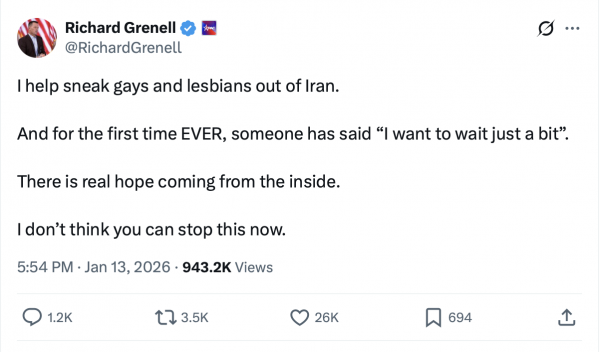
Grenell has been a longtime supporter of the president.
“Richard Grenell is a fabulous person, A STAR,” Trump posted on Truth Social days before his official appointment to the ambassador role. “He will be someplace, high up! DJT”
Iran, which is experiencing demonstrations across all 31 provinces of the country — including in Tehran, the capital — started as a result of a financial crisis causing the collapse of its national currency. Time magazine credits this uprising after the U.N. re-imposed sanctions in September over the country’s pursuit of nuclear weapons.
As basic necessities like bread, rice, meat, and medical supplies become increasingly unaffordable to the majority of the more than 90 million people living there, citizens took to the streets to push back against Iran’s theocratic regime.
Grenell, who was made president and executive director of the John F. Kennedy Center for the Performing Arts last year by Trump, believes that people in the majority Shiite Muslim country are also beginning to protest human rights abuses.
Iran is among only a handful of countries in which consensual same-sex sexual relations remain punishable by death, according to the Death Penalty Information Center.

